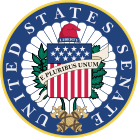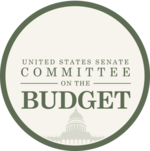Senate_Budget_Committee
United States Senate Committee on the Budget
Standing committee of the U.S. Senate
The United States Senate Committee on the Budget was established by the Congressional Budget and Impoundment Control Act of 1974. It is responsible for drafting Congress's annual budget plan and monitoring action on the budget for the Federal Government. The committee has jurisdiction over the Congressional Budget Office. The committee briefly operated as a special committee from 1919 to 1920 during the 66th Congress, before being made a standing committee in 1974.[1]
This article needs additional citations for verification. (October 2016) |
| Standing committee | |
|---|---|
Active United States Senate 118th Congress | |
 | |
| History | |
| Formed | 1974 |
| Leadership | |
| Chair | Sheldon Whitehouse (D) Since January 3, 2023 |
| Ranking member | Chuck Grassley (R) Since January 3, 2023 |
| Structure | |
| Seats | 21 |
| Political parties | Majority (11)
|
| Jurisdiction | |
| Policy areas | Budgetary policy and process, Fiscal policy, Government spending, Public debt, Tax expenditures |
| Oversight authority | Congressional Budget Office |
| House counterpart | House Budget Committee |
| Meeting place | |
| 608 Dirksen Senate Office Building Washington, DC 20510 | |
| Website | |
| www | |
| Rules | |
The current Chair is Rhode Island Senator Sheldon Whitehouse, and the Ranking Member is Iowa Senator Chuck Grassley.
The Budget Committee should not be confused with the Finance Committee and the Appropriations Committee, both of which have different jurisdictions: The Finance Committee is analogous to the Ways and Means Committee in the House of Representatives; it has legislative jurisdiction in the areas of taxes, Social Security, Medicare, Medicaid and some other entitlements. The Appropriations Committee has legislative jurisdiction over appropriations bills, which provide funding for government programs.
While the budget resolution prepared by the Budget Committee sets out a broad blueprint for the Congress with respect to the total levels of revenues and spending for the government as a whole, these other Committees prepare bills for specific tax and spending policies.
| Majority[2] | Minority[3] |
|---|---|
|
|
| Chairs | Party | State | Years | |
|---|---|---|---|---|
| Edmund S. Muskie | Democratic | Maine | 1975–1980 | |
| Ernest F. Hollings | Democratic | South Carolina | 1980–1981 | |
| Pete Domenici | Republican | New Mexico | 1981–1987 | |
| Lawton Chiles | Democratic | Florida | 1987–1989 | |
| James Sasser | Democratic | Tennessee | 1989–1995 | |
| Pete Domenici | Republican | New Mexico | 1995–2001 | |
| Kent Conrad | Democratic | North Dakota | 2001[lower-alpha 2] | |
| Pete Domenici | Republican | New Mexico | 2001 | |
| Kent Conrad | Democratic | North Dakota | 2001–2003[lower-alpha 3] | |
| Don Nickles | Republican | Oklahoma | 2003–2005 | |
| Judd Gregg | Republican | New Hampshire | 2005–2007 | |
| Kent Conrad | Democratic | North Dakota | 2007–2013 | |
| Patty Murray | Democratic | Washington | 2013–2015 | |
| Mike Enzi | Republican | Wyoming | 2015–2021 | |
| Bernie Sanders | Independent[lower-alpha 1] | Vermont | 2021–2023 | |
| Sheldon Whitehouse | Democratic | Rhode Island | 2023–present | |
117th Congress
| Majority | Minority |
|---|---|
|
|
Source:[4]
116th Congress
| Majority | Minority |
|---|---|
|
|
115th Congress
| Majority | Minority |
|---|---|
|
|
114th Congress
| Majority | Minority |
|---|---|
|
|
113th Congress
| Majority | Minority |
|---|---|
|
|
112th Congress
| Majority | Minority |
|---|---|
|
|
111th Congress
| Majority | Minority |
|---|---|
|
|
110th Congress
| Majority | Minority |
|---|---|
|
|
109th Congress
| Majority | Minority |
|---|---|
|
|
- At the beginning of the 107th Congress in January 2001 the Senate was evenly divided. With a Democratic president and vice president still serving until January 20, the Democratic vice president was available to break a tie, and the Democrats thus controlled the Senate for 17 days, from January 3 to January 20. On January 3 the Senate adopted S. Res. 7 designating Democratic senators as committee chairmen to serve during this period and Republican chairmen to serve effective at noon on January 20, 2001.